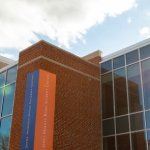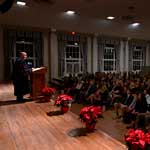
Seven years ago, Lauren Celano ’00 was in the midst of launching Propel Careers, a company that combined her passion for professional development with her entrepreneurial aspirations.
It was equal parts exhilarating and exhausting, but it was what she knew she was meant to do. She even enrolled in Boston University’s MBA program, focusing on health care and entrepreneurship, so she could learn the skills she needed to make her business dreams come true.
Despite her success, though, she couldn’t help but wonder—what could she have accomplished had she gained an entrepreneurial perspective at a younger age?
“As an undergraduate, I didn’t even think entrepreneurship was something that was possible,” the biochemistry and molecular biology major explained. “There wasn’t as much support for students to explore it then, as there is now.”
Today, she is one of several alumni serving as a mentor for the College’s Entrepreneurial Fellowship program, helping students solve an identified market need and hone their entrepreneurial skills. The program is one of several administered by the newly launched Entrepreneurship and Social Innovation Initiative, which is creating a campus culture that embraces entrepreneurial activities and social innovation, empowers students to leverage their liberal arts education, and encourages the pursuit of ideas that will have a positive impact on the world.
She believes the benefits of entrepreneurship— like the development of professional skills, personal growth, and positive economic impact—extend beyond building a business.
“For the students here, now, it’s an exciting time,” Celano said. “There is nothing to hold them back in terms of opportunity.”
Expanding entrepreneurship learning experiences is a goal of the College’s strategic plan.
Providing an opportunity for student innovation was one of the reasons why a group of alums created the Entrepreneurial Fellowship in 2014. Since then, it has turned into a platform for alumni to connect with students in a meaningful way and, combined with $10,000 in seed money, allowed eight students to kickstart six ventures in the past three years.
Bob Allen ’89, Nick Johnson ’90, and the other founders of the program agree that this is exactly what they hoped to accomplish.
“We were looking for a way to both differentiate Gettysburg from other private liberal arts colleges and find ways for current students to connect with alumni in meaningful and lasting ways,” Allen said. “The lure of entrepreneurship fits with the mindset of today’s students, and we are able to connect them with the practical experience they need to get their ideas up and running.”
For our alumni, mentorship can be as simple as making an introduction or connecting their resources with a student’s need, but for students, it’s the difference between having an idea and being able to turn that idea into something more.
Since the founding of the program, Johnson has stayed involved both as a member of the Entrepreneurial Fellowship Advisory Council and as an alumni mentor for two student ventures. He’s used his network to help his mentees get a better sense of their market and gain invaluable insight.
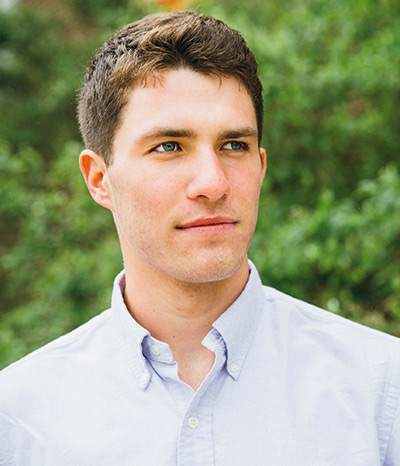 “Nick Johnson is probably one of the most well-connected people I’ve ever met,” said Noah Pompan ’18, cofounder of BOOM Social—a social media platform that connects college students with real-time events posted by their peers, school, and local businesses.
“Nick Johnson is probably one of the most well-connected people I’ve ever met,” said Noah Pompan ’18, cofounder of BOOM Social—a social media platform that connects college students with real-time events posted by their peers, school, and local businesses.
Both Pompan and his cofounder, Tyler Peterson at the University of California, Santa Barbara campus, were able to connect with countless industry insiders thanks to Johnson’s introductions, including Steven Rosenblatt, the president of Foursquare—a leader in real-time event updates.
“So there we are, on the phone with the president of this multimillion- dollar company, talking about BOOM Social and how we think it’s going to solve a problem that a lot of college students have,” said Pompan. “We pitched BOOM to him, and he really liked it. He gave us some great advice.”
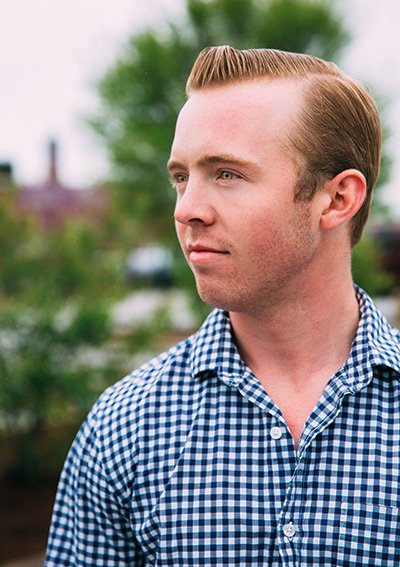 Connections like this are what helped Roby Burch ’17 expand the scope of his Philadelphia-based venture Blue Truck. A service company that does everything from running errands and moving furniture to painting and the occasional event planning, Burch knew that he needed another vehicle if he wanted to grow his company and keep it financially viable.
Connections like this are what helped Roby Burch ’17 expand the scope of his Philadelphia-based venture Blue Truck. A service company that does everything from running errands and moving furniture to painting and the occasional event planning, Burch knew that he needed another vehicle if he wanted to grow his company and keep it financially viable.
That’s when Burch’s mentors— principal at CoreMatrix Systems, Paul Nix ’74; president and CEO of Heyman Associates, Bill Heyman ’74; and president of The Haldeman Dealerships, Paul Haldeman ’67—mobilized.
Through Haldeman’s business connections, Burch was able to secure a second truck, helping him expand his operations and earn back his $10,000 seed money within the first month of his launch. By the end of the summer, his profits grew to $60,000. Burch said he found the intangible aspects of his alumni mentor’s support to be the most valuable.
“The funding is great—it’s a very big deal, but I would say having these guys to bounce your ideas off of, is even greater,” Burch said. “They are what a good entrepreneur should aspire to be, because they’ve done it. They know what it’s like to start from square one and build something bigger.”
It’s the ability to have an impact on their students’ lives that keeps many of the mentors involved.
“I’ve always maintained that more students than any of us realize have an interest in becoming an entrepreneur,” said Haldeman. “Few have the knowledge and courage to pursue their dream.”
Haldeman learned first-hand when he left his corporate job with Ford Motor Company in 1975 to pursue his dream of owning a car dealership. He now owns three dealerships, a collision center, a real estate partnership, and a private jet charter business.
He’s stayed true to his mission to inspire young entrepreneurs, too. In 1997, he created the Paul R. Haldeman ’67 Endowed Scholarship for business or economic majors with an interest in entrepreneurial studies, and volunteers his time and resources as a member of the Entrepreneurial Fellowship Advisory Council, in addition to his work as a mentor.
“Young people need to understand how to get started, as well as the amazing benefits of ownership, and the many risks involved,” Haldeman said.
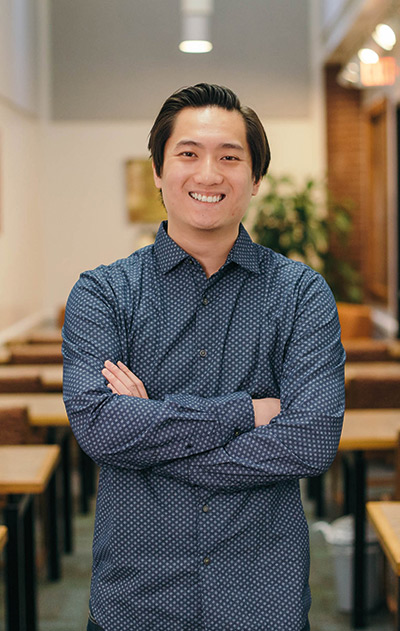 For inaugural Entrepreneurial Fellow and ScholarOasis.com founder Wei Xiong ’15, the important role his mentors played in launching his business factored heavily into his decision to continue the cycle of mentorship after his graduation.
For inaugural Entrepreneurial Fellow and ScholarOasis.com founder Wei Xiong ’15, the important role his mentors played in launching his business factored heavily into his decision to continue the cycle of mentorship after his graduation.
“These are lifelong relationships,” Xiong explained. He’s still in touch with his mentors—Johnson and Allen—because of how they have helped him navigate the highs and lows of entrepreneurship.
“With this program, you have so many people who want you to succeed, and that doesn’t just end after the duration of the Fellowship.” Success after the Fellowship can take many different forms.
For Xiong, he works as a solution developer for Deloitte and has continued to explore his entrepreneurial interests. In fact, he’s served as an alumni mentor for the program and is the technical cofounder of Borderwise, a startup that is streamlining green card applications and connecting immigrants to the legal representation they need to navigate their path to citizenship.
For Celano, she realizes that these skills are invaluable in every profession, and that they can be a foundation for career success.
“Thinking about building a business and solving a market need are useful skills, no matter what you end up doing,” Celano said.
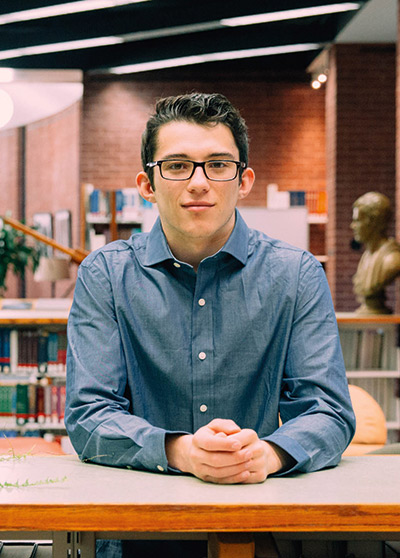 Her words couldn’t be more true for her mentee. Having created all of the original code necessary to complete No Scribe, William Czubakowski ’17’s experience as a Fellow has helped him understand his strengths and identify his next career steps.
Her words couldn’t be more true for her mentee. Having created all of the original code necessary to complete No Scribe, William Czubakowski ’17’s experience as a Fellow has helped him understand his strengths and identify his next career steps.
“If I had done this as a research project instead, I’m sure I could have gotten a few papers out of it,” Czubakowski said. “I’m happy to have it as a business because now I can keep expanding on it, improving it, and actually make something that is useful. I can see the results, and it’s helped me to realize the type of work I want to pursue after I graduate.”
This ability to have an impact is why Celano stays involved and why she believes so many others stay involved, too.
“Everyone wants to have an impact,” Celano said. “People want to know that they can make a difference. Through entrepreneurship and through this program, students, parents, and alumni are able to work together to make that happen.”
